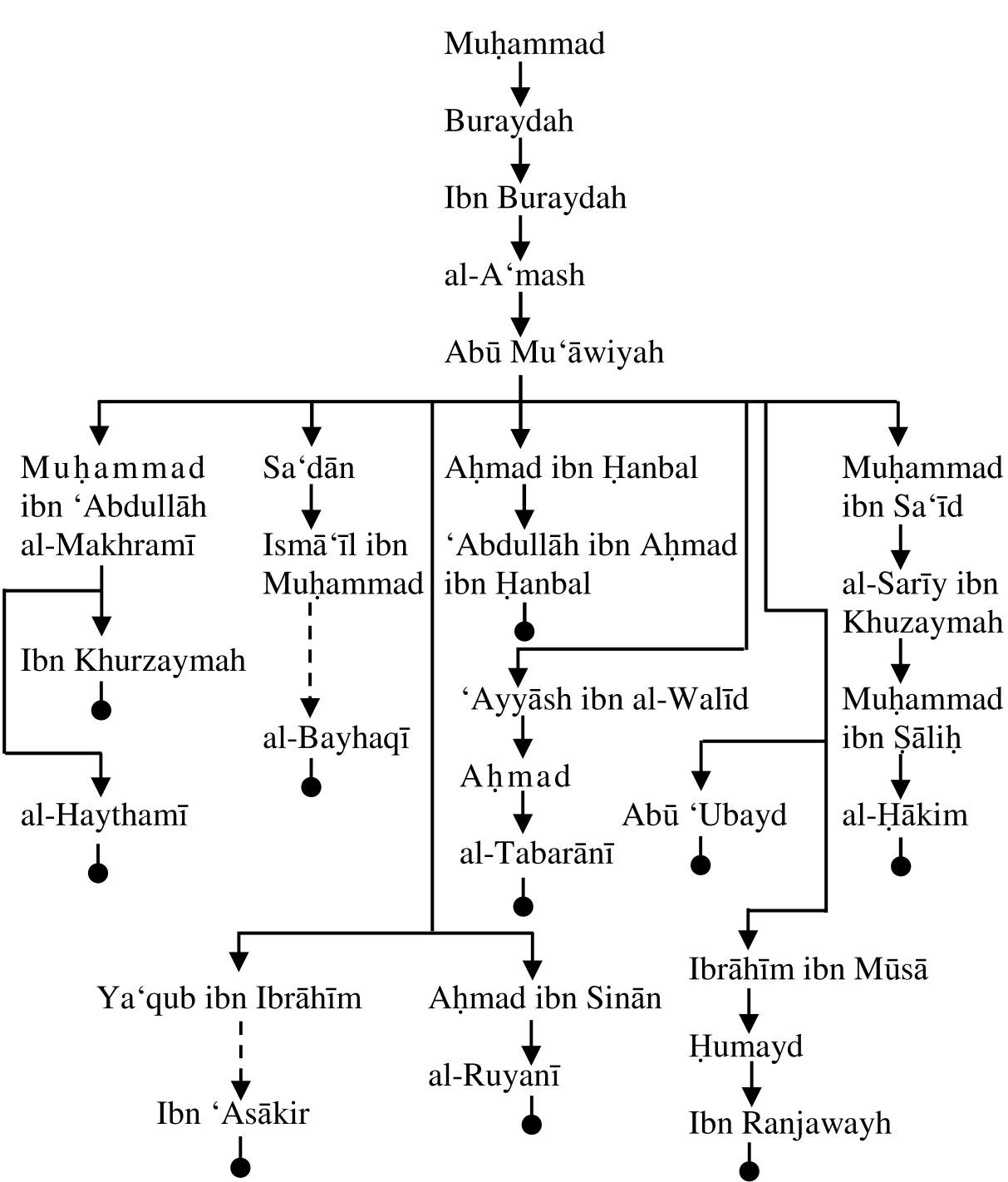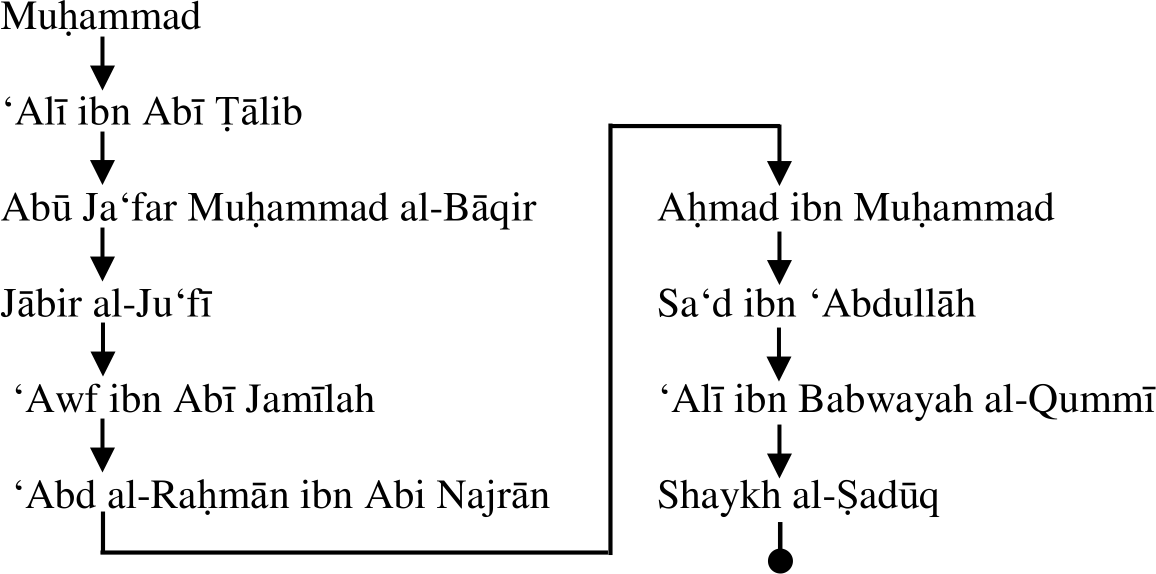(1)
حدثنا عبد اللّٰهِ حدثني أبي ثنا أبو
مُعَاوِيَةَ ثنا الأَعْمَشُ عَنِ بن بُرَيْدَةَ عن أبيه قال أبو
مُعَاوِيَةَ وَلاَ أُرَاهُ سَمِعَهُ منه قال قال رسول اللّٰهِ
صلي اللّٰه عليه وسلم ما يُخْرِجُ رَجُلٌ شَيْئاً مِنَ
الصَّدَقَةِ حتي يَفُكَّ عنها لَحْيَيْ سَبْعِينَ شَيْطَاناً
Buraydah states
that God’s Messenger said: “Whenever a person spends in
charity, seventy devils emerge from his beard.”
Following is
the schematic illustration of the isnad of this narrative’s
variants:

As specified in
the text of the above cited narrative Abu Mu‘awiyah says that
he does not think that al-A‘mash has heard this narrative from
Ibn Buraydah.
Al-Bukhari
actually specifies that al-A‘mash has not heard from Ibn
Buraydah.
(2)
أبي (ره) قال حدثنا سعد بن عبد الله عن
أحمد بن محمد عن عبد الرحمن ابن أبي نجران عن أبي جميلة عن جابر
عن أبي جعفر عليه السلام قال : قال علي بن أبي طالب عليه السلام
تصدقت يوما بدينار قال لي رسول الله صلي الله عليه وآله أما علمت
يا علي ان صدقة المؤمن لا تخرج من يديه حتي يفك عنها عن لحي
سبعين شيطانا كلهم يأمروه بان لا تفعل وما يقع في يد السائل حتي
يقع في يد الرب جل جلاله ثم تلا هذه الآية اَلَمۡ یَعۡلَمُوۡا
اَنَّ اللّٰهَ هُوَ یَقۡبَلُ التَّوۡبَةَ عَنۡ عِبَادِهِ وَ
یَاۡخُذُ الصَّدَقٰتِ وَ اَنَّ اللّٰهَ هُوَ التَّوَّابُ
الرَّحِیۡمُ
Abu Ja‘far Muhammad al-Baqir stated: “ ‘Ali
ibn Abi Talib said that God’s Messenger said to me regarding a
coin of dinar I spent in charity: ‘O ‘Ali! As soon as charity
leaves the hand of a believer seventy devils leave his chin
each of them bids him to not spend in charity and as soon as
it reaches the hand of a needy person, it reaches hand of his
Lord.’ Then he recited this verse:اَلَمۡ
یَعۡلَمُوۡا اَنَّ اللّٰهَ هُوَ یَقۡبَلُ التَّوۡبَةَ عَنۡ
عِبَادِهِ وَ یَاۡخُذُ الصَّدَقٰتِ وَ اَنَّ اللّٰهَ هُوَ
التَّوَّابُ الرَّحِیۡمُ.

The narrative is broken as Abu Ja‘far
Muhammad al-Baqir (57-114 AH) never met ‘Ali (d. 40 AH).
Moreover, according to al-Najashi, Jabir
ibn Yazid al-Ju‘fi is mukhtalit.
Moreover the narrative is reported through a chain of
narration that ends on one of their imams Baqir: however
according to principles of historical criticism, it is weak
because Imam Baqir (57 – 117 AH)
never met ‘Ali (d. 40 AH).
It may also be noted that while some
authorities in Sunni rijal books regard Jabir to be reliable,
others have done jarh on him. Here is some of the jarh
recorded about him by al-Mizzi: In the opinion of Yahya ibn
Ma‘in, as reported by ‘Abbas al-Duri, Jabir is a great liar (kadhdhab).
Imam Abu Hanifah says that he has not met anyone who is a
bigger liar than Jabir. Abu Hatim reports from Ahmad ibn
Hanbal that Yahya and ‘Abd al-Rahman al-Mahdi had abandoned
him (tarakahu). According to al-Nasa’i, he is matruk al-hadith;
at another place, he says that he is laysa bi thiqah wa la
yuktabu hadithuhu.
Al-Hakim calls him dhahib al-hadith. According to Ibn Hajar,
he is da‘if and rafidi.
(3)
علي بن إبراهيم ، عن أبيه ، عن ابن أبي عمير
، عن عبد الله بن سنان قال : سمعت أبا عبد الله (عليه السلام)
يقول : الصدقة باليد تقي ميتة السوء وتدفع سبعين نوعا من أنواع
البلاء وتفك عن لحي سبعين شيطانا كلهم يأمره أن لا يفعل
‘Abdullah ibn Sinan stated: “I heard Abu
‘Abdullah Ja‘far al-Sadiq say: ‘Charity averts awful death and
wards of seventy types of hardships and sends out seventy
devils from the chin each of which bids that person to not do
charity.”
Following is
the schematic illustration of the isnad of this narrative:

The narrative is obviously broken
because Ja‘far al-Sadiq (83-148 AH) never met the Prophet (sws).
________________
_____________________
|